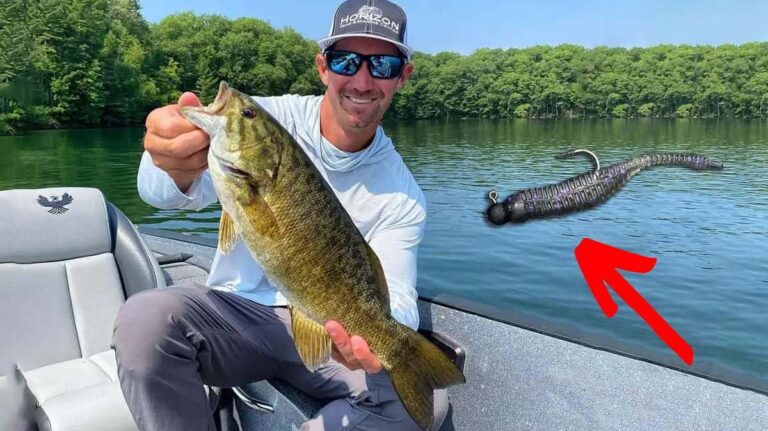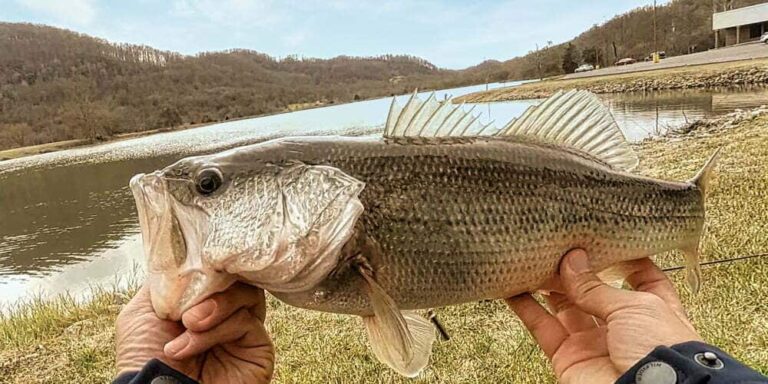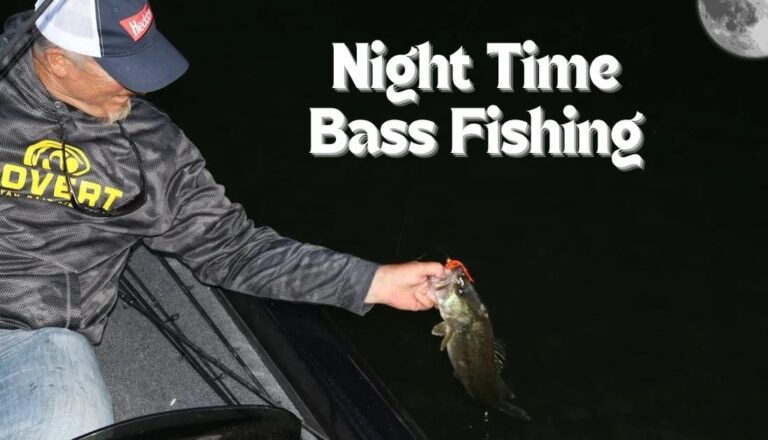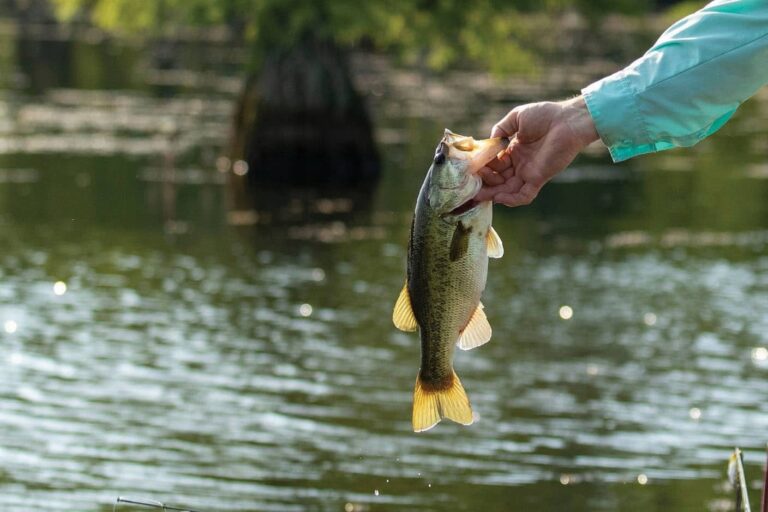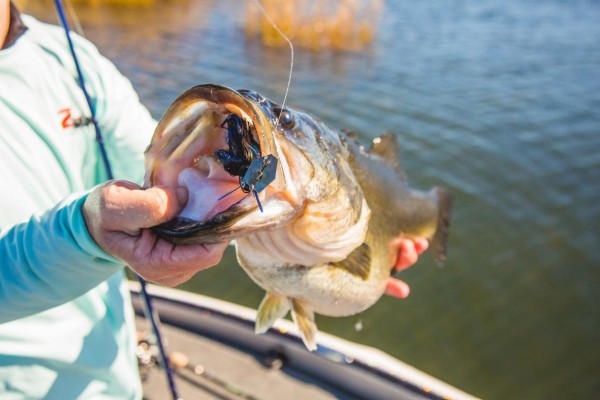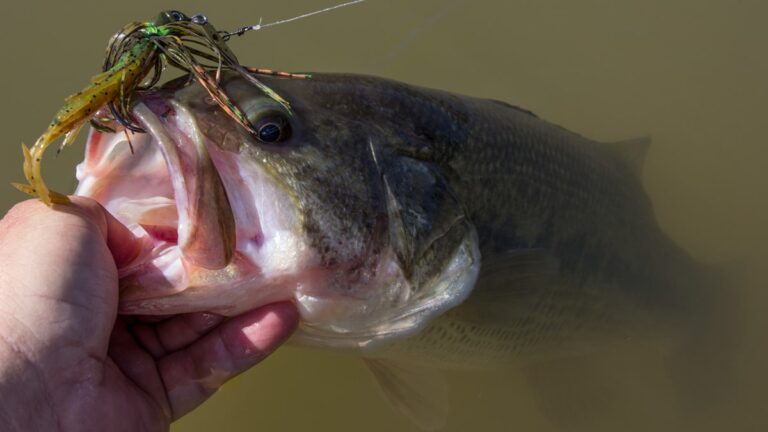Can You Eat Bass from a Pond? Safe or Dangerous
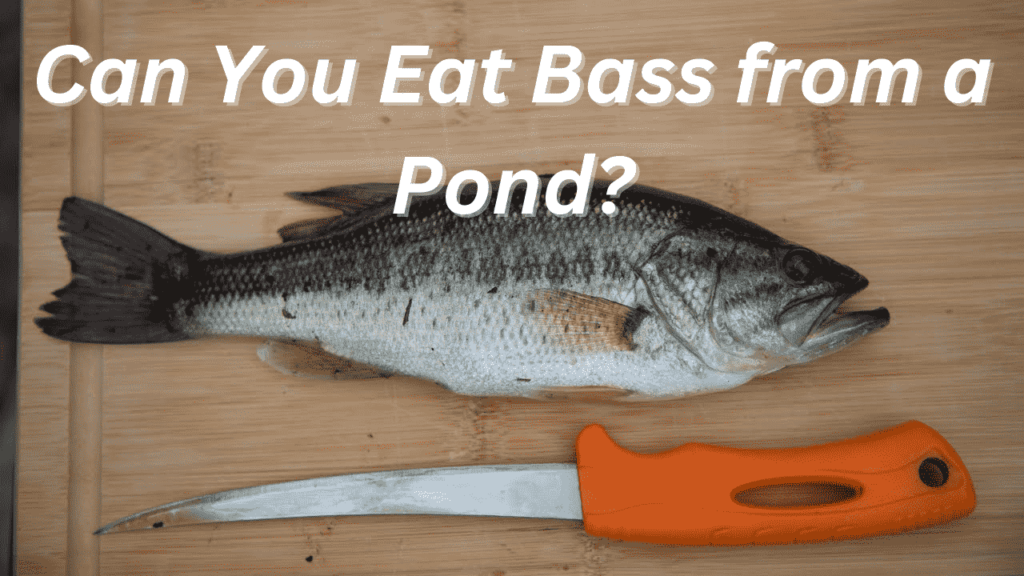
Although not often found at the grocery store, largemouth and smallmouth bass are delicious and make a great meal.
So if you can’t find bass at the store, you are going to have to catch it yourself.
But can you eat bass from a pond, or will you need to make a long trip to a lake or river to get fresh, safe bass meat?
Can You Eat Bass From a Pond?
There are two types of ponds. These are natural ponds and man-made ponds.
If you are fishing and catching bass out of a natural pond that is more secluded from people and foot traffic, the bass will be safe to eat.
However, it is more likely that you are fishing for bass in a man-made pond in your neighborhood or near your home.
These ponds are typically considered not safe to eat from.
Why Are these Ponds Unsafe to Eat Bass From?
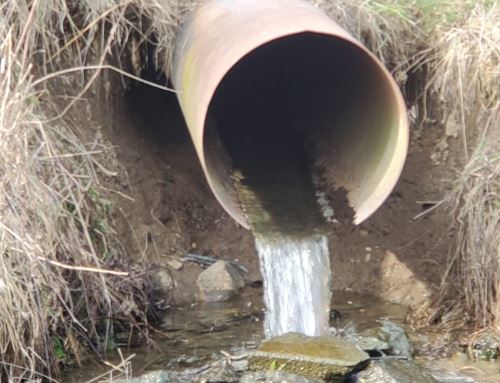
Neighborhood ponds and bodies of water are typically right near homes, roads, parks, and other scenic locations.
All of the chemicals that people use to grow grass, kill bugs, paint the sidewalks, and other things will wash into the pond when it rains.
Many ponds even have drainage pipes that bring in water from all around the surrounding neighborhoods.
These pipes wash in all types of harmful chemicals, insecticides, pesticides, and herbicides that people use on their house and yard.
So what happens is that the bass and other fish in the ponds absorb these chemicals into their skin and meat.
How Dangerous Are the Pond Bass to Eat?
Now if you eat bass from your local pond one time, you most likely won’t get sick or experience any serious.
But there certainly are harmful things inside bass from a pond, so it is still unsafe and should be avoided.
Do Bass Taste Good?
Bass do taste very good and make a great meal if you can find safe places to catch them.
Bass have a very mild flavor that is similar to a tilapia or crappie. Because of the mild flavor, it is best to use lots of seasonings, breading, or lemon juice to liven up the flavor.
I personally don’t like super fishy tasting species like lots of saltwater fish.
So bass, specifically largemouth, is one of my favorite catch and cook fish species.
Where to Catch Safe Bass to Eat
Like I said earlier, if you can find a natural and secluded pond in your area, the bass in those waters will be perfectly safe to eat.
Also, if you have a large river near you, these are great options for catching healthy bass.
Large rivers are much much bigger than ponds and receive less pollution from the surrounding areas.
The problem with these rivers is that they are not super common. I live in the Richmond, VA area and the James river is just a 15-20 minute drive from my house.
So I am lucky enough to have access to clean and delicious fish that I can catch and cook.
If you are not this lucky, you can go onto your state or city’s wildlife management website and search for public lakes that contain edible fish.
Every state will have some options where you can catch and eat bass, so don’t take the risk by eating bass from your neighborhood pond.
My Favorite Recipe: Grilled Lemon Herb Bass
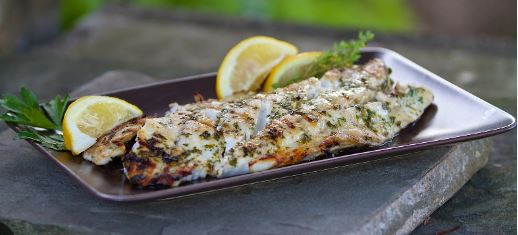
Ingredients
- 2 largemouth bass fillets
- 2 tablespoons olive oil
- 2 tablespoons fresh lemon juice
- 2 cloves garlic, minced
- 1 teaspoon dried oregano
- 1 teaspoon dried thyme
- Salt and black pepper to taste
- Lemon slices for garnish
- Fresh parsley, chopped (for garnish)
Instructions
- Preheat the Grill: Preheat your grill to medium-high heat. Make sure the grates are clean and lightly oiled to prevent sticking.
- Prepare the Marinade: In a small bowl, whisk together olive oil, lemon juice, minced garlic, dried oregano, dried thyme, salt, and black pepper. This will be your marinade for the bass.
- Marinate the Bass: Place the largemouth bass fillets in a shallow dish or a resealable plastic bag. Pour the marinade over the fillets, ensuring they are well-coated. Allow the fish to marinate for at least 15-20 minutes, allowing the flavors to infuse.
- Grill the Bass: Remove the bass fillets from the marinade and let any excess drip off. Place the fillets on the preheated grill. Grill each side for about 4-5 minutes or until the fish flakes easily with a fork. Cooking time may vary depending on the thickness of the fillets.
- Baste with Marinade: While grilling, occasionally baste the fillets with some of the leftover marinade. This will add extra flavor and keep the fish moist.
- Check for Doneness: Make sure the fish is cooked through but be cautious not to overcook, as it can result in a dry texture. The flesh should be opaque and easily flaked.
- Serve: Carefully remove the grilled largemouth bass from the grill and transfer it to a serving platter. Garnish with lemon slices and chopped fresh parsley.
- Enjoy: Serve your grilled largemouth bass with your favorite sides, such as rice, quinoa, or a fresh green salad. Enjoy the delicious flavors of the lemon and herbs complementing the natural taste of the bass.
Key Points
- Safety Concerns: Eating bass from a pond can be safe if certain factors are considered, such as water quality, pollution levels, and potential contaminants.
- Water Source Assessment: Conduct a thorough assessment of the pond’s water source and quality to determine if it’s suitable for fish consumption. Factors like industrial runoff, agricultural activities, and urban development can impact water purity.
- Regulations and Guidelines: Check local regulations and guidelines regarding fishing and consuming fish from ponds. Authorities often provide recommendations based on water quality assessments and potential health risks.
- Health Risks: Bass from polluted or contaminated ponds can pose health risks due to the accumulation of heavy metals, pesticides, and other pollutants. Consuming contaminated fish may lead to various health issues, including mercury poisoning and gastrointestinal problems.
- Precautionary Measures: If unsure about the safety of bass from a pond, it’s advisable to err on the side of caution and refrain from consuming them. Opt for fish from trusted sources or locations known for clean water bodies.
FAQ
How to Determine If a Bass is Safe?
Conduct a thorough assessment of the pond’s water quality, considering factors such as industrial runoff, agricultural activities, and urban development near the pond.
Additionally, check local regulations and guidelines regarding fish consumption from ponds.
What are the Potential Health Risks?
Consuming bass from a polluted pond can pose various health risks due to the accumulation of heavy metals, pesticides, and other pollutants in the fish.
These contaminants can lead to health issues such as mercury poisoning and gastrointestinal problems.
Are There Any Precautionary Measures?
If uncertain about the safety of bass from a pond, it’s advisable to refrain from consuming them.
Opt for fish from trusted sources or locations known for clean water bodies to reduce the risk of exposure to contaminants.
Conclusion
The bass in your local, neighborhood pond are not considered safe to eat.
The chemicals and pollution from the surrounding areas will wash into the pond and the bass will soak up these harmful chemicals.
There are safe places to catch bass such as rivers, lakes, and wildlife management parks.
You may have to travel a bit farther to acquire these safe bass, but it is well worth it as there are few things more important than your health.

